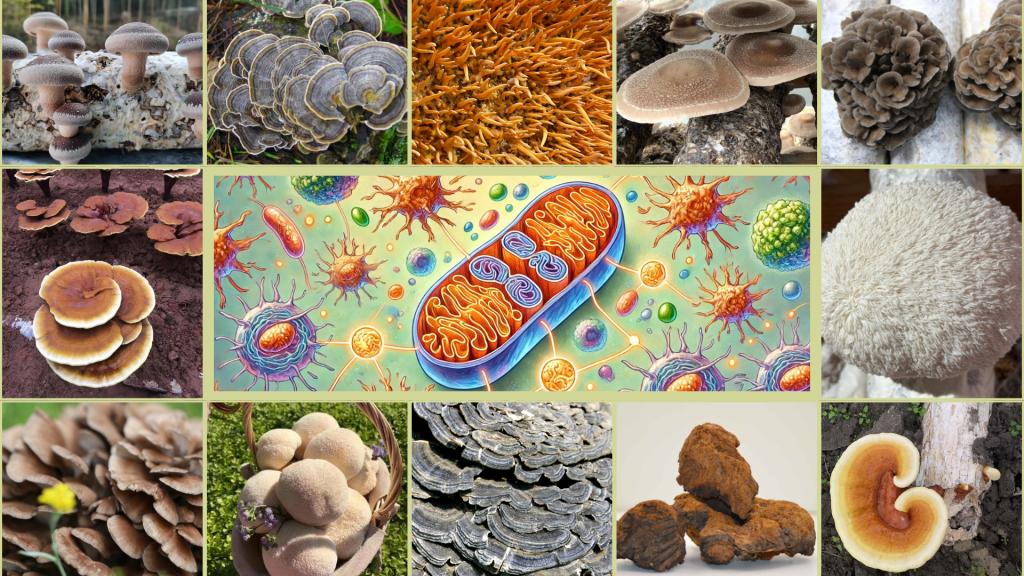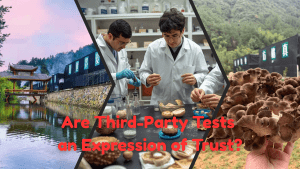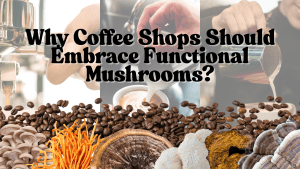When speaking about the immune system, we often use vague terms that don’t tell us what to do. We all want to feel great, have plenty of energy, and not get sick as often. To make this happen, I’ve learned it’s all about living a balanced, healthy life.
Taking care of my body and mind gives my immune system the best chance to do its job. This means it doesn’t have to work as hard fighting off toxins, germs, and infections or dealing with the effects of stress.
It’s up to me to make this happen!
By building my physical and mental strength, learning my diet, knowing what should or should not go into my kitchen, drinking plenty of water, sleeping 7-8 hours, exercising often, and trying to worry less, I can get the most out of what my immune system can provide.
And there are Mushrooms!
Due to their potent bioactive compounds and specific mechanisms of action, medicinal mushrooms can support and improve the immune system’s efficiency. They offer a holistic approach to optimal health, whether in teas, extracts, or culinary dishes.
This article summarizes the most effective mushrooms for immune health and their unique characteristics, mechanisms, and active ingredients.
Turkey Tail (Trametes (Coriolus) versicolor)
Characteristics: This mushroom has been used in traditional medicine for centuries. It is known for its vibrant, fan-shaped appearance, resembling a turkey’s tail.
Mechanism of Action: Turkey Tail is rich in Polysaccharopeptides (PSP) and polysaccharide-K (PSK), which enhance the immune system by stimulating macrophages and natural killer (NK) cells. These immune cells are essential for identifying and neutralizing pathogens and abnormal cells.
Active Ingredients:
- Polysaccharide-K (PSK)
- Polysaccharopeptides (PSP)
- Beta-glucans
Reishi (Ganoderma lucidum)
Characteristics: Dubbed the “Mushroom of Immortality,” Reishi is prized for its adaptogenic properties and immune-enhancing capabilities.
Mechanism of Action: Reishi contains beta-glucans and triterpenoids, which modulate the immune response. Beta-glucans activate dendritic cells and NK cells, enhancing pathogen recognition. Triterpenoids exhibit anti-inflammatory and anti-tumor effects, supporting overall immune balance.
Active Ingredients:
- Beta-glucans
- Triterpenoids (ganoderic acid)
- Polysaccharides
Shiitake (Lentinula edodes)
Characteristics: Popular in culinary dishes, Shiitake also possesses potent medicinal properties that bolster immune health.
Mechanism of Action: Lentinan, a beta-glucan unique to Shiitake, enhances the activity of T-helper and NK cells. Additionally, Shiitake promotes the production of cytokines, signaling proteins that regulate immune responses.
Active Ingredients:
- Lentinan (beta-glucan)
- Eritadenine
- Polysaccharides
Maitake (Grifola frondosa)
Characteristics: Known as the “Dancing Mushroom,” Maitake has a rich, earthy flavor and exceptional immune-boosting properties.
Mechanism of Action: Maitake’s D-fraction, a highly purified beta-glucan, stimulates phagocytosis, where immune cells engulf and destroy harmful pathogens. This mushroom also enhances the production of interleukin-1 (IL-1) and tumor necrosis factor-alpha (TNF-α), key mediators in immune defense.
Active Ingredients:
- Beta-glucans (D-fraction)
- Ergothioneine (antioxidant)
- Polysaccharides
Lion’s Mane (Hericium erinaceus)
Characteristics: Famed for its brain-boosting effects, Lion’s Mane also contributes to immune health.
Mechanism of Action: Lion’s Mane promotes the proliferation of beneficial gut bacteria, which is critical in immune system regulation. Its polysaccharides stimulate the activity of macrophages and other immune cells.
Active Ingredients:
- Hericenones and erinacines (nerve growth factors)
- Polysaccharides
- Beta-glucans
Chaga (Inonotus obliquus)
Characteristics: Often referred to as the “King of Medicinal Mushrooms,” Chaga is a powerhouse of antioxidants.
Mechanism of Action: Chaga’s Betulinic acid and polysaccharides activate immune cells and reduce oxidative stress, impairing immune function. Its melanin content contributes to its exceptional antioxidant capacity.
Active Ingredients:
- Betulinic acid
- Melanin
- Beta-glucans
- Polysaccharides
Cordyceps (Cordyceps militaris and Cordyceps sinensis)
Characteristics: Cordyceps is renowned for enhancing energy, endurance, and immune benefits.
Mechanism of Action: Cordyceps stimulates the production of adenosine triphosphate (ATP), which boosts cellular energy and supports immune cell function. It also enhances the activity of macrophages and NK cells, improving pathogen elimination.
Active Ingredients:
- Cordycepin
- Adenosine
- Polysaccharides











